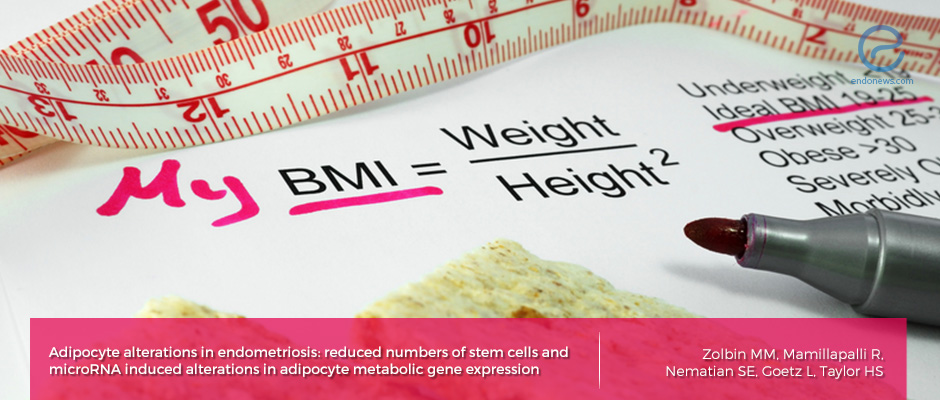The reason for lower BMI and less body fat in women with endometriosis.
May 30, 2019
Fat cells of women with endometriosis showed decreased nuclear RNA expression and lower proliferative ability.
Key Points
Highlights:
- Reduction in adipocyte stem cells and miRNA driven changes in adipocyte gene expression may contribute to metabolic alterations and low BMI in endometriotic women.
Importance:
- The decrease in the number of adipocyte stem cells in endometriosis patients could explain their low BMI and metabolic alterations.
What's done here:
- Subcutaneous fat tissues of women with and without endometriosis were collected for research.
Key results:
- The altered circulating microRNAs found in women with endometriosis, affect adipocyte gene expression and may be the mechanism for altered fat metabolism of the disorder.
- A lower proliferative ability of fat cells identified from endometriotic patients. Fat cells transfected with Let-7b (miRNA) decreased nuclear RNA expression and cell proliferation.
- The majority of adipocytes cultured from women without endometriosis continued proliferating in vitro, while the majority of cultured adipocytes from endometriotic patients did not.
- FACS analyses in mouse fat tissue showed a significantly higher number of stem cells in subcutaneous and visceral fat in the non-endometriosis group.
- The number of adipocyte stem cells is reduced in a mouse model of endometriosis.
Lay Summary
Zolbin et al. from the Department of Obstetrics and Gynecology of Yale School of Medicine, New Haven, USA, recently published the results of their prospective controlled research on adipocyte alterations in endometriosis, in the journal "Reproductive Biology and Endocrinology".
Endometriosis can be determined as a gynecologic disorder characterized deposition and proliferation of endometrial cells outside the uterus and caused pelvic pain as well as infertility in women. One of the unrelated gynecological symptoms about this disorder is lipid dysfunction as subcutaneous fat atrophy and fibrosis, along with a low BMI.
Despite all theories up until now were inadequate to explain the pathophysiology of the above changes, altered stem cell mobility is of interest. Mesenchymal stromal progenitor/stem cells called MSCs are found surrounding mature adipocytes and miRNAs have been implicated in controlling MSCs differentiation into adipocyte lineages.
To search what causes to altered fat metabolism in endometriotic women, they collected sterile fat specimens of the abdominal region of 20 endometriotic and 20 non-endometriotic patients who underwent a laparoscopic operation in their clinic and prepared cell cultures from these samples to obtain adipocytes.
As adipocytes are the main source of leptin and adipoq, to test the miRNA levels of them they selected to study with Let-7b and 342-3p and their mimics.
The second step of their research to determine whether endometriosis affect the stem cell properties they use 6 female mice aged 9 weeks to create endometriosis and 5 same aged mice for the control group.
İn their comment the authors publicized that they demonstrated significant alterations in the adipocytes of endometriotic women to explain the low BMI and metabolic alterations commonly observed in this disorder.
Research Source: https://www.ncbi.nlm.nih.gov/pubmed/30982470
Adipocyte fat tissue BMI miRNA MSCs adipocyte stem cell Let-7b miR-342-3p gene expression mouse model endometriosis.

